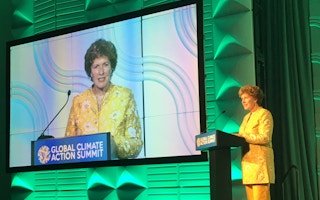The governments of France, Germany and the United Kingdom and the world’s biggest philanthropic organisations have launched a new funding platform that aims to lend a minimum of US$20 million to boost renewable energy investments in Southeast Asia, particularly in solar, wind, and storage.
To continue reading, subscribe to Eco‑Business.
There's something for everyone. We offer a range of subscription plans.
- Access our stories and receive our Insights Weekly newsletter with the free EB Member plan.
- Unlock unlimited access to our content and archive with EB Circle.
- Publish your content with EB Premium.
At the One Planet summit in New York in September, the partnership, which included philanthropic foundations such as the Bloomberg Philanthropies, European Climate Foundation (ECF), Children’s Investment Fund Foundation (UK), IKEA Foundation, and the Growald Family Fund (GFF) unveiled the Southeast Asia Clean Energy Facility (SEACEF).
The funding platform aims to boost the early stage of renewable energy project developments particularly in Southeast Asia’s major coal-burning countries—Indonesia, Vietnam and the Philippines.
“
Southeast Asia is home to growing economies and innovative companies, and it can help lead the global charge in adopting clean energy and reducing fossil fuels.
Michael Bloomberg, founder, Bloomberg Philanthropies
A potential phase two of the project will also allocate funding to Myanmar, Thailand and other Southeast Asian countries.
“Southeast Asia is home to growing economies and innovative companies, and it can help lead the global charge in adopting clean energy and reducing fossil fuels,” Michael Bloomberg, founder of Bloomberg Philanthropies and UN Special Envoy for Climate Action, said in a statement.
Despite its abundant wind and sunshine, solar and wind are considered new entrants in Southeast Asia’s renewable energy mix, contributing only 100 MW to total generation capacity in 2011, rising to 3.5 GW and 1.1 GW, respectively in 2016. Large hydropower has contributed up to 75 per cent but dam breaches that endanger communities have raised questions over the sustainability of this source.
Lack of access to capital, especially during the early stage of solar and wind energy project development, makes set up costs high, with development banks, commercial banks and traditional private equity generally only participating in the later stages of project development.
This enables coal burning to continue in the Southeast Asian region, which already leads the world in CO2 emission growth per capita at 263 per cent increase from 1990-2013. This is expected to reach the emissions level of India, largely driven by coal, and exposes up to 1 in 10 people to suffer major damage from climate change, making it among the most vulnerable regions globally.
US-based charity Growald Family Fund expressed hope that the funding platform will break these policy and financial barriers to renewable energy and energy efficiency investments in the region.
“This partnership will help generate the necessary data and evidence that can potentially transform electricity markets and shift the paradigm away from fossil fuel dependent economies to clean, safe, and sustainable alternatives,” GFF said in a statement.
Both the government agencies and the philanthropic organisations will provide funding, with the former lending technical assistance in the funding’s implementation and the latter identifying the projects.
A unique feature of the platform—which is targeted to launch in 2019—is that it will be replenishable instead of being granted once. Repayments will go back to the funding platform and will be used to finance future projects.
Project developers from governments and private businesses can access anywhere from US$100,000 to US$1,000,000 per project.
Rida Mulyana, director general of New, Renewable Energy and Energy Conservation of Indonesia’s Ministry of Energy and Mineral Resources, expressed hope that the initiative will increase clean energy investments in the biggest coal-burning country in the region. “Indonesia’s abundant renewable energy sources are the key to supporting inclusive and sustainable economic growth now and in the future,” she said.
Nguyen Thi Dieu Trinh, senior official with the Vietnamese Ministry of Planning and Investment, said that the idea of having a shared roadmap to speed up clean energy deployment is encouraging, but its implementation must consider a country’s political and economic situations. “The aim is not only for sustainable economic growth but also for social inclusivity,” she said.
Jochen Flasbarth, state secretary at Germany’s Federal Ministry of the Environment, Nature Conservation and Nuclear Safety, said that Southeast Asia’s switch to renewable energy is urgently needed to deliver on the global commitments to tackle climate change forged in the 2015 Paris Agreement.
“Accelerating the uptake of renewable energy and energy efficiency is also a golden opportunity to lock-in long-term prosperity and a secure, affordable energy supply for Southeast Asia’s citizens in the future,” he said.








